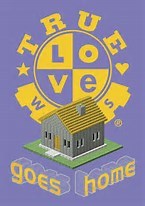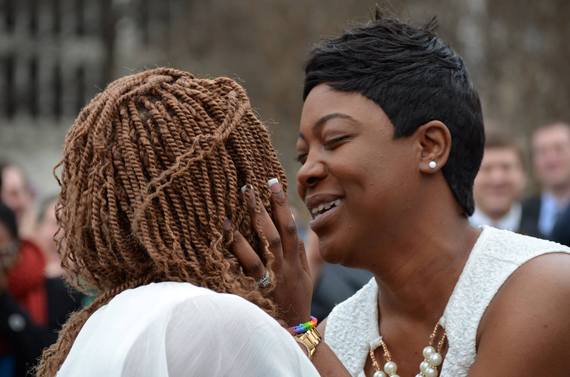
This article originally appeared in Patheos.com> Progressive Christian Channel > Faith Forward.
The day after I became the first Southern Baptist minister to officiate at a same-sex wedding, Rick Lance of the Alabama Baptist State Board of Missions and Travis Coleman, Jr., president of the Alabama Baptist State Convention, issued a joint statement called "Stand Strong For Biblical Marriage." The statement said that any Southern Baptist minister who officiated at a same-sex wedding risked being "disfellowshipped" from the Southern Baptist Convention. The Madison Baptist Association through which my church, Weatherly Heights Baptist, belongs to the Convention followed with the decision to remove us from fellowship.
Afterwards, I found myself asking, "When did 'biblical marriage' get to be a thing?" And when did "biblical marriage" come to mean opposition to same-sex marriage?
To clarify, I'm not talking about marriage as it appears in the Bible. I'm talking about the cultural movement which became a catch phrase: "biblical marriage."
Lifeway Christian Resources appears to have been a key player in the development of "biblical marriage." Lifeway is the merchandise arm of the Southern Baptist Convention. In 20 languages and 186 stores, it offers "biblical solutions to life." These solutions are available through Bibles, vacation bible school materials, church music, books, magazines, gifts, videos, music, jewelry, and hundreds of thousands of "commitment cards."
Whether merchandise was cause or effect, Lifeway undertook a focused plan to promote the idea that control over sexuality is fundamental to Christianity. Through a series of campaigns, the focus was expanded demographically and ideologically.
In 1992, Lifeway launched "True Love Waits." The campaign promoted pre-marital sexual abstinence. "Believing that true love waits," teenagers pledged on a commitment card "to be sexually abstinent until I enter a biblical marriage relationship."
In 1993, True Love Waits entered into a partnership with Youth for Christ, a Protestant evangelical organization. With the partnership, the idea of a biblical marriage relationship went well beyond personal sexual matters. It became associated with the outward purposes of evangelism and missions.
In 1997, True Love Waits developed its Crossing Bridges with Purity program. There was a broadening of the message from simple pre-marital sexual abstinence to pre-marital sexual purity which meant such things as not using pornography. "Biblical marriage," while not invoked per se, was being defined. What strikes me about these abstinence programs, however, is that they do not appear to have been associated with anxiety over intimate same-sex relationships.
However, American anxiety over same-sex marriage had also become a thing. In a separate but related development, the United States Congress passed the Defense of Marriage Act [DOMA]. Signed by President Bill Clinton in 1996, the landmark act defined marriage as "a legal union between one man and one woman" and banned Federal recognition of same-sex marriages. DOMA was the culmination of two decades of state bans on same-sex marriages.
In 1973, Maryland had become the first state to enact such a ban. Through 1994, nearly every other state in the Union followed suit. As if that were not enough, two years after DOMA, Hawaii and Alaska passed state constitutional amendments against same-sex marriage as did twenty-nine other states.
 Meanwhile, there were developments in the biblical marriage movement. In 2003, Lifeway Christian Resources expanded the scope of its message to include parents with its True Love Waits Goes Home program. Having previously expanded its demographic focus to include college students, with this campaign Lifeway went well beyond its original task of encouraging teenagers not to engage in pre-marital sexual activity.
Meanwhile, there were developments in the biblical marriage movement. In 2003, Lifeway Christian Resources expanded the scope of its message to include parents with its True Love Waits Goes Home program. Having previously expanded its demographic focus to include college students, with this campaign Lifeway went well beyond its original task of encouraging teenagers not to engage in pre-marital sexual activity.
Now it was attempting to control the sexual activities of full grown presumably straight men and women inside marriage. Parents committed to abstain from "pornography, impure touching and conversations, and sex outside a biblical marriage relationship from this day forward."
In 2006, there was an interesting turn of events. The Washington, DC based think tank, The Heritage Foundation, took up the cause of marital purity. The Foundation promoted free enterprise, individual liberty, limited government, traditional American values, and a strong national security apparatus. It launched a campaign similar to the True Love Waits campaign through its website familyfacts.org. The language of the website indicates the Foundation's belief that purity in marriage is related to family "safety" and by extension to national security.
The kind of anxiety which could connect sexuality to national security issues in the U.S. is not unprecedented. The Lavender Scare of the '50s, by which gays in the State Department were considered a threat to national security, was a parallel development of the McCarthy era's "Red Scare" fear of Communists there.
With the scope of both Lifeway's and The Heritage Foundation's programs focusing on adults in the context of marriage, my guess is that it was right about here that "biblical marriage" began to take on the meaning of opposition to same-sex marriage.
The tide began to turn in June, 2013. The U.S. Supreme Court recognized the same-sex marriage of Edith Windsor and Thea Spyer, invalidating a key part of DOMA. Like dominoes, state bans on same-sex marriage began falling.
Clearly, for those in the Southern Baptist Convention who disfellowshipped my church, "biblical marriage" is a thing. If this inquiry into the origins of "biblical marriage" are borne out in other investigations, the Convention may have to face the fact that those origins do not necessarily trace to the Bible.
Many thanks to Jonathan Harwell of Rollins College who helped research this article.
You can find Ellin Jimmerson at thesecondcooler.com, on Twitter @EllinJimmerson, on her blog and on Facebook at The Second Cooler Fan Page.

